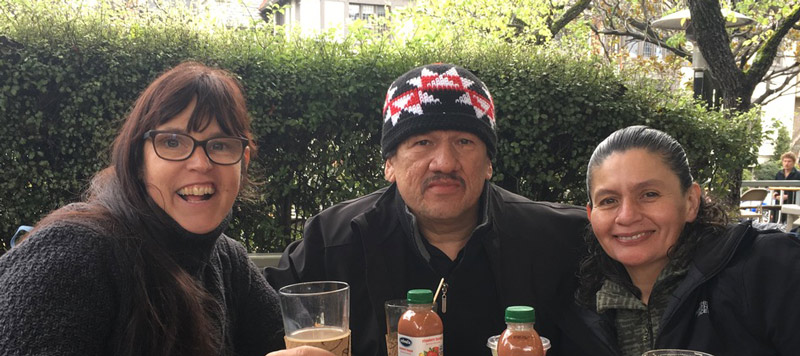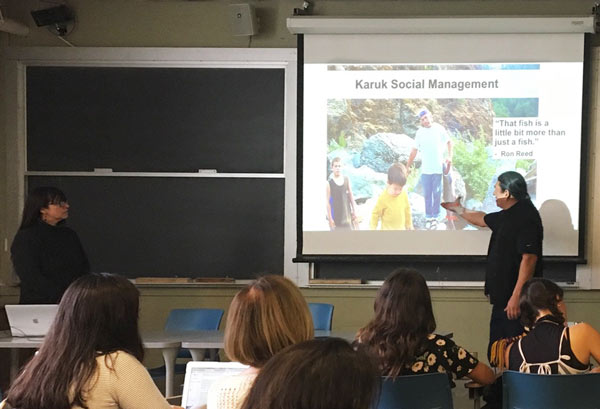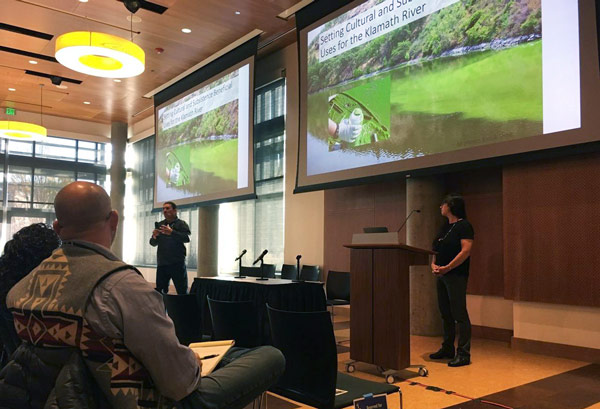
Kari Norgaard (left) with research collaborator Ron Reed (center) and Robyn Reed (right)
I have had the privilege to carry out collaborative research on a variety of projects with the Karuk Tribe since 2003. This work began with the publication of research linking the artificially high rate of diet-related diseases like diabetes and heart disease to the declining salmon availability and the Klamath River dams and continues today with a variety of climate change related projects.
Karuk Tribe Climate Change Projects website
Selected Peer-Reviewed Publications

Kari Norgaard and Ron Reed speaking at UC Berkeley in March 2019
Ron Reed and Kari Norgaard. "Food is Fire" Ethnic Studies Review, Vol. 44, Issue 2, pp. 5–18, 2021.
Ron Reed and Kari Norgaard, Karuk Social Management and Climate Change in the mid Klamath Basin High Desert Museum, Bend Oregon (Virtual Presentation), November 2020.
Norgaard, Kari, Ron Reed and JM Bacon 2018. “How Environmental Decline Restructures Indigenous Gender Practices: What Happens to Karuk Masculinity When There Are No Fish?” Sociology of Race and Ethnicity 4(1): 98-113.
Norgaard, Kari Marie and Ron Reed 2017. “Emotional impacts of environmental decline: What can Native cosmologies teach sociology about emotions and environmental justice?” Theory and Society 46(6): 463-495.
Willette, Mirranda, Kari Marie Norgaard and Ron Reed 2016. “You Got to Have Fish: Families, Environmental Decline and Cultural Reproduction” Families, Relationships and Societies 5(3): 375-392.
Norgaard, Kari Marie 2014. “The Politics of Fire and the Social Impacts of Fire Exclusion on the Klamath” Humboldt Journal of Social Relations 39: 73-97
Davis, Emily, Aaron David, Kari Norgaard, Timothy Parker, Kara McKay, Toz Soto, Cristine Tenant, Kate Rowe and Ron Reed. 2013. “Distribution, Abundance and Population Age Structure of Freshwater Mussels in the Klamath and Salmon Rivers of Northern California” Northwest Science 87(3): 189-206.
Norgaard, Kari, Spenser Meeks, Brice Crayne and Frank Dunnivant 2013. “Trace Metal Analysis of Karuk Traditional Foods in the Klamath River” Journal of Environmental Management 4: 319-328.
Alkon, Alison and Kari Marie Norgaard 2009. “Breaking the Food Chains: An Investigation of Food Justice Activism” Sociological Inquiry 79(3): 289-305.
Hormel, Leontina and Kari Marie Norgaard 2009 “Bring the Salmon Home! Karuk Challenges to Capitalist Incorporation” Critical Sociology 35(3): 343-366.
Selected Research Reports

Ron Reed and Kari Marie Norgaard speaking at the Western Humanities Association Conference 2019
Karuk Tribe Climate Vulnerability Assessment: Assessing Vulnerabilities From the Increased Frequency of High Severity Fire Karuk Tribe, 2016
Karuk Traditional Ecological Knowledge and the Need for Knowledge Sovereignty: Social, Cultural and Economic Impacts of Denied Access to Traditional Management Karuk Tribe, 2014
Retaining Knowledge Sovereignty: Practical Steps Towards Expanding the Application of Karuk Traditional Knowledge in the Face of Climate Change Karuk Tribe, 2014
The Effects of Altered Diet on the Health of the Karuk People Karuk Tribe, 2005. Filed November 2005 with Federal Energy Regulatory Commission on Behalf of the Karuk Tribe in the Klamath River Project re-licensing process.
Selected Book Chapters
Norgaard, Kari Marie, Ron Reed and Carolina Van Horn, “A Continuing Legacy: Institutional Racism, Hunger and Nutritional Justice on the Klamath” in Allison Hope Alkon and Julian Agyerman editors, Cultivating Food Justice: Race, Class and Sustainability, MIT Press, 2011.
Reed, Ron and Kari Marie Norgaard “Salmon Feeds Our People: Challenging Dams on the Klamath River” pp 7-16 in Walker Painemilla, K., Rylands, A B., Woofter, A., & Hughes, C. eds. Indigenous People and Conservation: From Rights to Resource Management. Conservation International: Arlington VA, 2010.